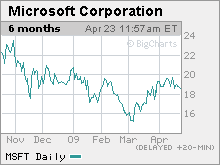CNN are reporting that Microsoft is facing its first fall in sales in more than 2 decades, and in the midst of a poor economic climate the Redmond based behemoth will clearly now be refocusing its efforts on regaining its previous market dominance, but what’s caused this turn of events?
It’s no surprise that consumers are spending less cash nowadays, lets face it, if you’re struggling to put petrol in your car and food on your table, a shiny new piece of new tech is going to be the first item on the chopping block, and in this instance people are simply buying fewer laptops and desktops. Instead, the market has seen a shift towards the lower cost alternative that is offered by purchasing a netbook, many of which run on open-source OS’s or older versions (and therefore cheaper) of the Windows OS, which of course means a hefty hit for the Microsoft profit margin – a factor that surely played a part in the massive 32% fall in net income that the company has reported this year.
It’s a situation that’s unlikely to get any better for Microsoft unless it addresses the root causes, one of which, I believe, is a general lack of faith for its operating systems and products amongst the tech community. The release of XP in its semi-stable and extremely vulnerable launch state required immediate patching to plug the holes that quickly became evident. It’s been a similar story for Vista too and now the web is awash with statements to the effect of "Windows 7 is what Vista should have been", which is all fine and dandy - but that’s what Vista should have been. It almost seems as if Microsoft approach the building of its operating systems with a "better late than never" attitude – get it out the door, then patch it afterwards.
All the while, alternative OS’s and hardware vendors have been beavering away on their own projects and gaining market share – particularly this year where we have seen a large rise in the number of "average-Joe" users turning to open-source for their wares.
Naturally, the successful growth of Apple across various sectors will be hurting the Washington HQ in more ways than one, and with the recent news that the iPhone OS is the most used mobile operating system in the world, its a wake-up call that current size and market position can’t always be relied upon as an indicator for further growth if the techie populous is losing faith.
It’s not just the PC division of the big M that is struggling though, the entertainment and devices division reported a 2% decline in revenue and operating losses of $31 million over the past year – it seems the reliability of its products has once again hampered ambitions - the XBOX 360 that is part of this division is well known for its unreliability and its fondness for red lights, otherwise known as the RROD. In fact, the only area of Microsoft that didn’t see a decline in sales and revenue is its business server division that managed to report modest increases in sales and 24% in revenue.
For the record, I think the new Windows 7 is a huge improvement over previous versions of the Windows OS experience and yes, maybe it is what Vista should have been, but now the challenge for Microsoft is going to be rebuilding consumers and professionals faith in its products. Still, to put it in perspective the 6% fall equates to Microsoft "only" achieving $13.7 billion dollars in sales, so don’t shed too many tears for Bill just yet.

3 thoughts on “What’s behind Microsoft’s first sales drop in 23 years?”
Some good points here. I think that while Microsoft aren’t making as much as they used to during the good times, the comapany will always do well, as it provides the default OS on pretty much every PC or laptop that you buy from a High Street shop.
Also, I can’t imagine big businesses or universities or other organisations that buy PCs in bulk not offering the Microsoft Office Suite for their employees/ students to use.
Q: Why didn’t the Home Office award a contract for 100 new, technologically-advanced busses to Microsoft?
A: They kept crashing every five minutes
Sack Steve Jobs! He’s the bloomin’ problem. He’s a salesman, a good one but still a salesman. Messing with Yahoo and the like when he should be focusing on the core business Operating Systems!